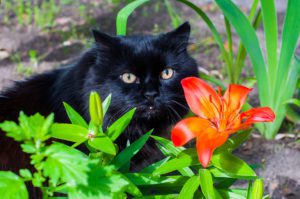
There are hundreds of plants that can cause harm to your cat. It is essential to understand why these plants are harmful to deter your cat away from them. One of the most poisonous plants to animals is lily flowers. As beautiful as they are, they are also deadly.
What are Lilies?
Lilies are beautiful flowers common throughout the world. Lilies are part of the Lilium family and are extremely toxic to consume. It is easy to spot lily plants because they have a unique appearance. Although they appear delicate and beautiful, they are dangerous.
Cat owners should not have lilies in their homes. If you have a lily plant, you should place it high up and out of reach. Lilies are not just plants but also flowers.
Most lily plants have one long and thick stem. At the top are six large flower petals that stretch.
They are skinny petals that make up a large and magnificent flower. The blooming flower comes in a variety of different colors as well.
The most common colors and patterns of lilies are:
- pink and purple
- purple and white
- pink and white
- hot pink and light pink
All lilies have a minimum of two tones and colors that offer a breathtaking contrast against each other.
This special plant also grows from thick bulbs planted in the ground. They are easy to grow and will sprout naturally in the wild, which can cause you problems if your cat is an outdoor pet.
Why are Lilies Toxic to Cats?
How can such a beautiful plant and flower be toxic to cats? Unlike other plants, there is not one part of a lily that your cat can consume. All parts of this vibrant and flashy flower are poisonous. However, it is not enough for your cat to sniff the flower; they have to consume it.
Some cats are curious and will munch on whatever they can. These sweet and cute creatures are happy and love to be around plants, which is why lilies are dangerous. The vibrant colors attract cats, which is a defense mechanism the plant has against animal prey.
Interestingly enough, lilies are not toxic to humans or dogs. Although cats and dogs often share allergies, the lily plant is not one of them. While this is the case, cats should stay away from lily leaves, petals, and pollen. According to some sources, if you store lilies in a water source, the water source is also contaminated by the toxin.
Scientists are still trying to understand what makes lily flowers toxic to only cats. So far, there are no definitive conclusions.
Other Plants That Are Poisonous to Cats
Sadly, there is a long list of plants that are toxic. You should frequently check this long list, especially if you allow your cat to go on playdates. Outdoor cats must be specially supervised as lilies grow in water sources like ponds and lakes.
Listed below are common toxic plants:
- Tulips
- Azaleas
- Daffodils
- Oleander
- Dieffenbachia (House Plants)
Most of the time, cats stay clear of these plants. Although this is the case, some cats are still curious enough to accidentally consume these toxic plants.
Symptoms of Lily Poisoning
How do you know if your cat is suffering from lily poisoning? Without proper vet testing, it is hard to know for sure. Although this is true, cats share common symptoms when they suffer from lily plant poisoning.
Sadly, the toxicity can cause severe health conditions and problems if you do not treat the symptoms right away.
If you notice that your cat is dehydrated, throwing up, and sleeping excessively, it could be because lilies have poisoned them.
Not only do cats suffer from stomach trouble, but they lose energy. It is common to see cats with lily poison exhausted and fatigued. You know your cat best. If there are toxic plants nearby and they begin to act strangely, it is likely because of the plant.
What To Do If Your Cat Consumes a Lily
You should always remain calm. Although it is scary to watch your cat’s symptoms, it is worse if you panic. First, provide your cat with water. Your cat will need to hydrate because of its symptoms.
Although throwing up and having diarrhea is not usually dangerous, it leads to dehydration which is dangerous. Cats that are dehydrated for too long can die from a stroke, heart attack, or fainting spell.
After providing your cat with water, please call us right away! This is serious, and this type of poisoning can be fatal. Your cat may need surgery, for instance, if the toxins damage any organs. You will not know until you take your cat for testing and scans.
Our Animal Hospital is Here for Your Cat
All in all, pet owners need to pay close attention to their surroundings. Some plants, like lilies, contain poisons and toxins throughout their petals and leaves that cause dangerous health effects.
If you have lilies, I suggest placing them outside or in an area that your cat cannot reach. However, these flowers are always a risk and should be treated as such.
If you have any questions, or fear your cat may be experiencing lily poisoning, contact our animal hospital right away at (715) 735-9511.
